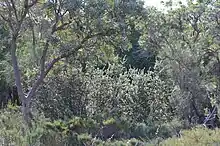

Kensington bushland reserve is a significant remnant of Swan Coastal Plain vegetation, that has been reserved in the suburb of Kensington, in Perth, Western Australia, by the state government.[1]
It is located west of Kent Street Senior High School, and lies on the north side of Kent Street. The portion of Jarrah Road that defined the western boundary of the reserve is a cul de sac, known as Baron Hay Court. Across the road is a Department of Agriculture complex. It is bounded to the north by Harold Rossiter Park, and George Reserve and has an area of 9.1 hectares (22 acres).[1] It is close to the Western Australian Herbarium. In 2000 it was designated as "Bush Forever Site 48" by the Government of Western Australia.[1]
It was made a reserve in the 1990s when the suburb was still located within Perth City council boundaries.[2][3][4] It is now within the Town of Victoria Park local government area, and is managed together with "The Kent Street Sand Pit" and the "George Street Reserve" (a contaminated landfill site) as a single entity, the "Jirdarup Bushland Precinct".[5] This Precinct has a total area of 17.9 hectares. The name Jirdarup is a Nyoongar word meaning "place of birds".[6] The Town of Victoria Park plans to rehabilitate the Sandpit site.[7]
Description
It lies on the Bassendean Dune system,[5][8] the oldest and most easterly of the sand dune systems of the Swan Coastal Plain.[9][10][11]
Flora
Key upper storey plant species within the bushland are Banksia menziesii, Banksia attenuata and Jarrah (Eucalyptus marginata). As of 2003, some 207 plant species have been found, representing 42 families and 111 genera.[5] Major weeds are Asparagus asparagoides, perennial veldt grass, Gladiolus caryophyllaceus, while Ehrharta longiflora, Ursinia anthemoides, and Misopates orontium are also threatening also to become a problem.[5]
This bushland is part of the threatened ecological community (TEC), Banksia woodlands of the Swan Coastal Plain, the main threats to which are: fragmentation, dieback,[12] weed invasion, inappropriate fire regimes and climate change.[5] In February 2016, a bushfire burned approximately 70% of the native vegetation of the reserve.[5]
List of Weeds found in Kensington Bushland[5] | |||
|---|---|---|---|
|
Fauna
Significant bird species which may be seen in the bushland are Carnaby's Black Cockatoo (Calyptorhynchus latirostris) - endangered, Forest Red-tailed Black Cockatoo (Calyptorhynchus banksii) - vulnerable, and the rainbow bee-eater (Merops ornatus),[5] with Forest Redtailed Black-Cockatoo being year-round residents of the area.[13] Pitfall trapping in 2017 found eight native reptiles. These included the western bobtail (Tiliqua rugosa), dugites (Pseudonaja affinis), the western bearded dragon (Pogona minor), and Buchanan's snake-eyed skink (Cryptoblepharus buchananii).[5]
This tiny piece of remnant bushland has often been the subject of surveys.[14][15][16][17][18] Thus, one of the first Australian records for the aphid, Uroleucon erigeronense is from Kensington Bushland.[16] The day-flying moth, Pollanisus occidentalis, is found in abundance in the bushland.[15] A new species of robber fly, Cerdistus hudsoni, has so far (2011) only been found in two places, one of which is Kensington Bushland.[14]
Galleries
- Native plants found and photographed in Kensington Bushland reserve
 Allocasuarina humilis 2018-06-21
Allocasuarina humilis 2018-06-21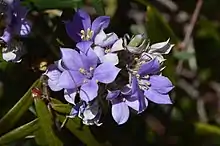 Billardiera fraseri 2016-01-19
Billardiera fraseri 2016-01-19 Calectasia 2007-10-08
Calectasia 2007-10-08.jpg.webp) Pimelea sulphurea 2016-10-09
Pimelea sulphurea 2016-10-09.jpg.webp) Nuytsia floribunda 2015-10-19
Nuytsia floribunda 2015-10-19 Jacksonia furcellata 2017-12-20
Jacksonia furcellata 2017-12-20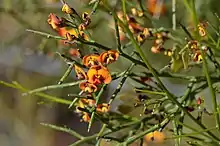 Daviesia divaricata 2011-10-13
Daviesia divaricata 2011-10-13.jpg.webp) Anigozanthos manglesii 2007-10-09
Anigozanthos manglesii 2007-10-09 Banksia attenuata 2007-10-19
Banksia attenuata 2007-10-19 Dasypogon bromeliifolius 2007-10-09
Dasypogon bromeliifolius 2007-10-09 Petrophile linearis 2007-10-16
Petrophile linearis 2007-10-16 Synaphea spinulosa 2007-10-16
Synaphea spinulosa 2007-10-16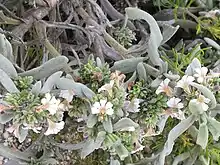 Scaevola canescens 2018-06-21
Scaevola canescens 2018-06-21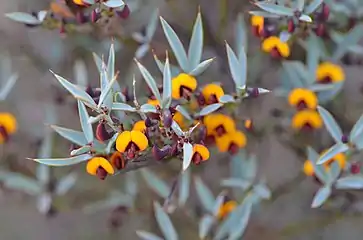 Daviesia nudiflora 2014-07-12
Daviesia nudiflora 2014-07-12


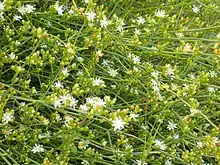


- Weeds found and photographed in Kensington Bushland reserve
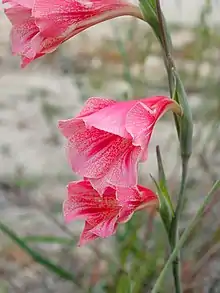
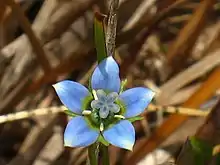

 Lupinus cosentinii
Lupinus cosentinii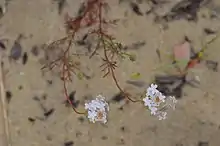

References
- 1 2 3 Western Australian Planning Commission, Perth, Western Australia (2000). "Bush Forever Volume 2: Directory of Bush Forever Sites: Kensington Bushland, Kensington" (PDF). Government of Western Australia [WA]. Retrieved 20 August 2018.
{{cite web}}: CS1 maint: multiple names: authors list (link) - ↑ Perth City Council. Department of Parks, Gardens and Landscape (1993), Kensington Bushland Management Plan : Draft, Perth City Council, ISBN 9789900058052
- ↑ Perth (W.A. : Municipality). Dept. of Parks, Gardens and Landscape (1993), Draft Kensington Bushland management plan, The Dept, retrieved 19 August 2018
- ↑ Perth (W.A (1993), Kensington bushland management plan, City of Perth, retrieved 19 August 2018
- 1 2 3 4 5 6 7 8 9 10 Eco Logical Australia 2017. Kensington Bushland Management Plan. Prepared for Town of Victoria Park.’ Retrieved 20 August 2018.
- ↑ "Jirdarup Bushland Precinct". visitperth.com. Retrieved 27 February 2023.
- ↑ Emerge Associates (2020). Design Opportunities and Considerations Report Kent Street Sand Pit (PDF).
- ↑ Broun, L. (2004), Banksia woodland resilience to groundwater drawdown on the Gnangara Mound, Edith Cowan University, Research Online, Perth, Western Australia, retrieved 20 August 2018
- ↑ Laliberté, E.; Turner, B. L.; Costes, T.; Pearse, S. J.; Wyrwoll, K.-H.; Zemunik, G.; Lambers, H. (2012). "Experimental assessment of nutrient limitation along a 2-million-year dune chronosequence in the south-western Australia biodiversity hotspot". Journal of Ecology. 100 (3): 631–642. doi:10.1111/j.1365-2745.2012.01962.x. ISSN 0022-0477. S2CID 54499926.
- ↑ Kendrick, G.W.; Wyrwoll, K.-H.; Szabo, B.J. (1991). "Pliocene-Pleistocene coastal events and history along the western margin of Australia". Quaternary Science Reviews. 10 (5): 419–439. Bibcode:1991QSRv...10..419K. doi:10.1016/0277-3791(91)90005-F. ISSN 0277-3791.
- ↑ McArthur, W.M, Bettenay, E, 1974. The development and distribution of the soils of the Swan Coastal Plain. Soil Publication No. 16. C.S.I.R.O.PDF
- ↑ Hill, T.C.J.; Tippett, J.T.; Shearer, B.L. (1994), "Invasion of Bassendean Dune Banksia Woodland by Phytophthora cinnamomi", Australian Journal of Botany, CSIRO PUBLISHING, 42 (6): 725–738, doi:10.1071/bt9940725, ISSN 1444-9862. pdf
- ↑ Byrne, M, Barrett, G, Finn, H, Blythman, M, Williams, M (2015) 'The 2015 Great Cocky Count.' At http://birdlife.org.au/documents/GCC-report-2015.pdf
- 1 2 Lavigne, Robert. 2011. A New Species of Asilidae (Insecta: Diptera) from Western Australia [online]. South Australian Naturalist, The, Vol. 85, No. 1, Jan-Jun 2011: 14-20. https://search.informit.com.au/documentSummary;dn=251913066834750;res=IELHSS. ISSN 0038-2965
- 1 2 Williams, M.R.2009. Butterflies and day-flying moths in a fragmented urban landscape, south-west Western Australia: patterns of species richness. Pacific Conservation Biology Vol. 15: 32–46. Surrey Beatty & Sons, Sydney.
- 1 2 Brumley, C.; Watson, L. (2017). "First records of Uroleucon erigeronense (Hemiptera: Aphididae) on Conyza (Asteraceae) from Australia, with descriptions of morphological variation, biological notes and an update for commonly used keys". Austral Entomology. 56 (3): 339–344. doi:10.1111/aen.12241. ISSN 2052-174X. S2CID 89204245. pdf
- ↑ Stenhouse, R.N. (2005). "Assessing Disturbance and Vegetation Condition in Urban Bushlands". Australasian Journal of Environmental Management. 12 (1): 16–26. doi:10.1080/14486563.2005.10648630. ISSN 1448-6563. S2CID 153680892.
- ↑ Heliyanto, Bambang; He, Tianhua; Lambers, Hans; Veneklaas, Erik J.; Krauss, Siegfried L. (2009). "Population Size Effects on Progeny Performance in Banksia ilicifolia R. Br. (Proteaceae)". HAYATI Journal of Biosciences. 16 (2): 43–48. doi:10.4308/hjb.16.2.43. ISSN 1978-3019.
External links
 Media related to Kensington Bushland at Wikimedia Commons
Media related to Kensington Bushland at Wikimedia Commons